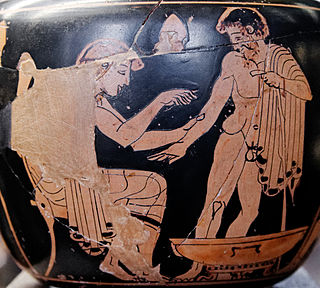
Aristotle was an Ancient Greek philosopher and polymath. His writings cover a broad range of subjects including physics, biology, zoology, metaphysics, logic, ethics, aesthetics, poetry, drama, music, rhetoric, psychology, linguistics, economics, politics, meteorology, geology, and government. As the founder of the Peripatetic school of philosophy in the Lyceum in Athens, he began the wider Aristotelian tradition that followed, which set the groundwork for the development of modern science.
The Conimbricenses were an important collection of Jesuit commentaries on Aristotle compiled at University of Coimbra in Coimbra, Portugal.

The Works of Aristotle, sometimes referred to by modern scholars as the Corpus Aristotelicum, is the collection of Aristotle's works that have survived from antiquity.

History of Animals is one of the major texts on biology by the ancient Greek philosopher Aristotle, who had studied at Plato's Academy in Athens. It was written in the fourth century BC; Aristotle died in 322 BC.
On Dreams is one of the short treatises that make up Aristotle's Parva Naturalia.
On Memory is one of the short treatises that make up Aristotle's Parva Naturalia. It is frequently published together, and read together, with Aristotle's De Anima.
On Length and Shortness of Life is a text by the Ancient Greek philosopher Aristotle and one of the Parva Naturalia.
On Divination in Sleep is a text by Aristotle in which he discusses precognitive dreams.

Sense and Sensibilia is one of the short treatises by Aristotle that make up the Parva Naturalia.
On Sleep is a text by Aristotle, one of the Parva Naturalia.

The Physics is a named text, written in ancient Greek, collated from a collection of surviving manuscripts known as the Corpus Aristotelicum, attributed to the 4th-century BC philosopher Aristotle.

Ingram Bywater, FBA was an English classical scholar.

Paul of Venice was a Catholic philosopher, theologian, logician and metaphysician of the Order of Saint Augustine.
Metaphysics is one of the principal works of Aristotle, in which he develops the doctrine that he calls First Philosophy. The work is a compilation of various texts treating abstract subjects, notably substance theory, different kinds of causation, form and matter, the existence of mathematical objects and the cosmos, which together constitute much of the branch of philosophy later known as metaphysics.

Ancient Greek medicine was a compilation of theories and practices that were constantly expanding through new ideologies and trials. Many components were considered in ancient Greek medicine, intertwining the spiritual with the physical. Specifically, the ancient Greeks believed health was affected by the humors, geographic location, social class, diet, trauma, beliefs, and mindset. Early on the ancient Greeks believed that illnesses were "divine punishments" and that healing was a "gift from the Gods". As trials continued wherein theories were tested against symptoms and results, the pure spiritual beliefs regarding "punishments" and "gifts" were replaced with a foundation based in the physical, i.e., cause and effect.

Latin translations of the 12th century were spurred by a major search by European scholars for new learning unavailable in western Europe at the time; their search led them to areas of southern Europe, particularly in central Spain and Sicily, which recently had come under Christian rule following their reconquest in the late 11th century. These areas had been under Muslim rule for a considerable time, and still had substantial Arabic-speaking populations to support their search. The combination of this accumulated knowledge and the substantial numbers of Arabic-speaking scholars there made these areas intellectually attractive, as well as culturally and politically accessible to Latin scholars. A typical story is that of Gerard of Cremona, who is said to have made his way to Toledo, well after its reconquest by Christians in 1085, because he
arrived at a knowledge of each part of [philosophy] according to the study of the Latins, nevertheless, because of his love for the Almagest, which he did not find at all amongst the Latins, he made his way to Toledo, where seeing an abundance of books in Arabic on every subject, and pitying the poverty he had experienced among the Latins concerning these subjects, out of his desire to translate he thoroughly learnt the Arabic language....
On Youth, Old Age, Life and Death, and Respiration is one of the short treatises that make up Aristotle's Parva Naturalia.
Michael of Ephesus or Michael Ephesius wrote important commentaries on Aristotle, including the first full commentary on the Sophistical Refutations, which established the regular study of that text.
The Rhetoric to Alexander is a treatise traditionally attributed to Aristotle. It was written by a Pseudo-Aristotle instead and is now generally believed to be the work of Anaximenes of Lampsacus.
On Marvellous Things Heard is a collection of thematically arranged anecdotes traditionally attributed to Aristotle but written by a Pseudo-Aristotle. The material included in the collection mainly deals with the natural world. The work is an example of the paradoxography literary genre.
 Parva Naturalia public domain audiobook at LibriVox
Parva Naturalia public domain audiobook at LibriVox 






